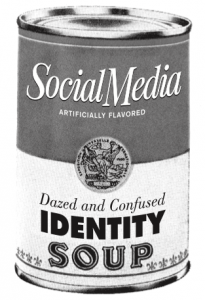My grandparents provided me with powerful examples of virtue which I would not have had had I grown up away from them.
I was twelve years old the first time that I noticed that something about Granny seemed amiss. She and Gramps (my grandfather) had come over for dinner and were enjoying the pre-dinner appetizers that my mother had laid out in the living room. Granny allowed herself to be given a glass of wine before dinner, and had been sipping it for about half an hour when my mother announced that dinner was ready and requested that we all migrate to the dining room. As we extracted ourselves from the living-room couches, my mother informed Granny that she had left her wine behind.
“Wine? What wine? I didn’t have any wine,” she protested.
“Yes, Mom, you did. It’s right over here,” my mother insisted, pointing to a glass on the table.
“But certainly that can’t be mine; I never drink wine this early in the afternoon!”
“Mom, nobody else was having any; who else could have drunk it?”
With a slightly disconcerted look, Granny quickly picked up the glass and sat herself down in the dining room without another word.
That was the first and last time I would see any frustration on Granny’s part over her Alzheimer’s.
Over the next ten years, Granny’s mental health gradually degenerated. She first lost her short-term memory, then her general sense of time, then she began to forget our faces, then finally the only thing she remembered was the sound of my grandfather’s voice. Throughout this time, she did her best to keep up appearances. I found, for example, a collection of pictures in her sock drawer one day. The pictures were of me, my sisters, my cousins, and my aunts and uncles. On the back of them were written our names, birthdays, and addresses. Presumably my grandmother would take these out to refresh her memory about us before she would see us. Even despite these safety measures, sometimes her dementia would get the better of her and she wouldn’t manage to recognize one of us. Whenever that would happen, she’d quickly blame it on the lighting in the room, give us a hug, and proceed to greet the next cousin in line. Eventually, when she couldn’t recognize any of us no matter how hard she tried, she would simply say, “Hello, Love! So good to see you! It’s been far too long!” Unfortunately, even this trick wasn’t fool-proof, as there were occasionally people present who had never met her before! Everyone knew she was pretending, but nobody let on about it.
What impressed me most about my grandmother’s attitude toward her disease was how little she wanted to burden anyone with it. In fact, it seemed that she even avoided burdening herself with it. She had Alzheimer’s. That wasn’t going to change. All that she could do was enjoy life as much as she could and do her best to make sure that everyone else did the same.
Equally impressive was the way Gramps handled the situation. At the time of the forgotten-wine-glass episode, Gramps was almost eighty years old and smoked two packs of cigarettes per day. He had tried several times to quit smoking, but at this point he figured he was too old for it to matter anymore. “I’ll be dead soon, what do I care?” he’d quip. But five years later, he was done with cigarettes. Perhaps even more impressive, he had given up eating butter!
He went through all this in order to be there for Granny. During those five years, he had suffered a heart attack and had to have two operations to fix a clogged artery in his thigh that wasn’t letting his blood bring antibiotics to his foot in order to quell an infection. Since the antibiotics were ineffective for so long, the infection in his foot grew so severe that part of his foot had to be amputated. Were it not for Granny, I’m sure that Gramps wouldn’t have cared much about his ailing health. He’d say that it was his time to go anyway. But at the time when he was going through these operations, he was the only person who Granny was familiar with. If she couldn’t be with him, she became agitated and confused (and pretty difficult to take care of). Gramps’ love and dedication to his wife motivated him to do what his love of his own life could not: endure through these operations and break a number of long-engrained habits.
My grandparents’ endurance through this trial exemplified many virtues, most especially fortitude, in ways that none of my other experiences have. Not only had both of my grandparents developed these virtues to an extremely high degree, but they also took on forms that I would never see in my daily life, where I’m surrounded mostly by people my age. Sure, young people can endure through difficulty and support one another in hard times. But can they do so when not only their bodies, but also their mental faculties are no longer nearly as functional as they once were? Furthermore, do they have the humility to accept help from younger, less experienced, more naïve family members? I doubt it.
For me, reflecting on these experiences illustrates the importance of living nearby the multiple generations that make up one’s family. In today’s world, where young people leave their parents to go off to college and then find a job in some faraway city, we are missing many opportunities to learn from our parents, grandparents, and even great-grandparents. It’s not enough merely to be told what to expect in old age; to be able to see it lived out virtuously will prepare one for one’s “golden years” better than could any textbook on virtue.












